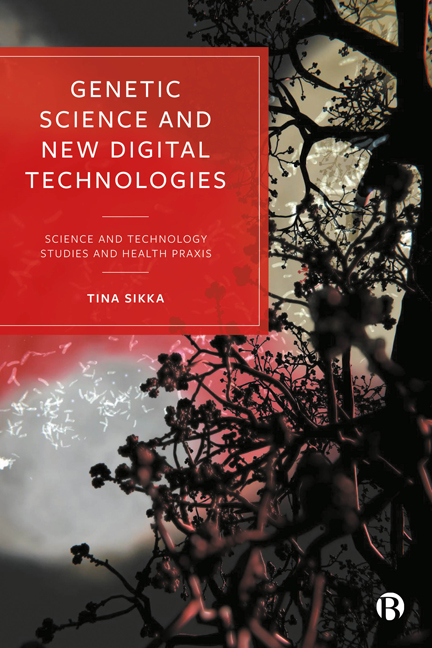Book contents
- Frontmatter
- Contents
- Notes on Contributors
- Introduction
- 1 Social and Behavioural Genomics and the Ethics of (In)Visibility
- 2 PureHealth: Feminist New Materialism, Posthuman Auto-Ethnography and Hegemonic Health Assemblages
- 3 Ambivalent Embodiment and HIV Treatment in South Africa
- 4 An ‘Artificial’ Concept as the Opposite of Human Dignity
- 5 Health Praxis in the Age of Artificial Intelligence: Diagnostics, Caregiving and Reimagining the Role(s) of Healthcare Practitioners
- 6 Digital Health Technological Advancements and Gender Dynamics in STS
- 7 Automation in Medical Imaging: Who Gets What AI Sees? Insights from the Adopters’ Perspective
- 8 Robots for Care: A Few Considerations from the Social Sciences
- 9 Are Ovulation Biosensors Feminist Technologies?
- Conclusion
- Index
2 - PureHealth: Feminist New Materialism, Posthuman Auto-Ethnography and Hegemonic Health Assemblages
Published online by Cambridge University Press: 28 March 2024
- Frontmatter
- Contents
- Notes on Contributors
- Introduction
- 1 Social and Behavioural Genomics and the Ethics of (In)Visibility
- 2 PureHealth: Feminist New Materialism, Posthuman Auto-Ethnography and Hegemonic Health Assemblages
- 3 Ambivalent Embodiment and HIV Treatment in South Africa
- 4 An ‘Artificial’ Concept as the Opposite of Human Dignity
- 5 Health Praxis in the Age of Artificial Intelligence: Diagnostics, Caregiving and Reimagining the Role(s) of Healthcare Practitioners
- 6 Digital Health Technological Advancements and Gender Dynamics in STS
- 7 Automation in Medical Imaging: Who Gets What AI Sees? Insights from the Adopters’ Perspective
- 8 Robots for Care: A Few Considerations from the Social Sciences
- 9 Are Ovulation Biosensors Feminist Technologies?
- Conclusion
- Index
Summary
Introduction
I begin this chapter with a brief overview of the state of play vis-a-vis immunity-boosting supplements and COVID-19, followed by an overview and analysis of my generative methodological framework. Note that I ground this study in an understanding of health that is based on my previous work and which I define as ‘a co-produced state of idealized expectations, performances, embodiments and patterns of consumption dominated by gendered and raced technophilic knowledge regimes that reproduce regimented and coercive Western standards of health and well-being’ or CICT (Sikka, 2022, 2023). Following a precis of this definition, I apply my ‘auto-ethnographic and rhizomatic socio-material feminist approach to science and technology’ method in four phases, via: (1) a case study-driven overview of Purearth, a UK-based wellness company; (2) a deeper discussion of method; (3) the application of new materialism to the company and its products through the use of an ‘agential cut’; and (4) an auto-ethnographic exegesis through which I chronicle and reflect on my consumption of Purearth’s ‘Immunity Drinks Pack’ over approximately ten days.
Case study: Purearth
Purearth is a London-based wellness company (incorporated in 2012) that sells vegan and organic ‘water kefirs, cleanses, juices, shots and broths’, in recyclable bottles, and whose ‘ostensible mission’ is to ‘help people live healthier lives by using what nature provides us in its most pure and organic form’ (Purearth, 2021). The company is funded primarily through Nexus Investment Ventures, a corporate, venture-capitalist seed fund whose latest funding round raised $447,000 for the company (Crunchbase, 2021; PitchBook, 2021). Its owners are two early to middle age White women, Tenna Anette and Angelina, who have been working in the health and wellness industry as practitioners for a number of years. The company has been written up, and its products reviewed, in such outlets as Country & Town House (Cox, 2020), which called its cleanse ‘one of the most enjoyable restrictive or preset diet plans out there’ Retail Times (Briggs, 2020), Wow Beauty, which invites readers to consume Purearth products and, in doing so, ‘drink their way to gut health’ (Wow Beauty, 2018) and The Telegraph (Howell, 2019), which, in a review, gave its kefir drink a 10/ 10.
- Type
- Chapter
- Information
- Genetic Science and New Digital TechnologiesScience and Technology Studies and Health Praxis, pp. 28 - 52Publisher: Bristol University PressPrint publication year: 2023

